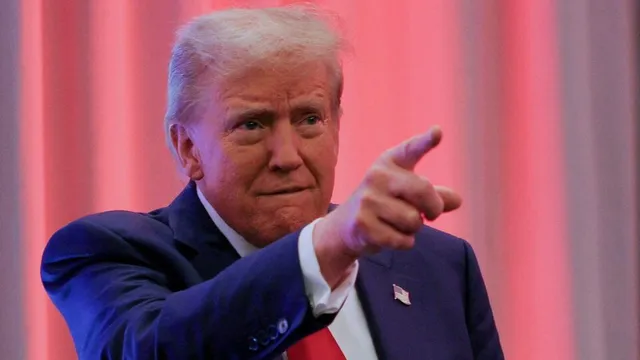- By Supratik Das
- Sat, 19 Jul 2025 10:40 AM (IST)
- Source:JND
US President Donald Trump has once again stirred controversy by claiming that five fighter jets were shot down during the recent conflict between India and Pakistan following the deadly Pahalgam terror attack. The comments, which were spoken during a dinner with Republican lawmakers at the White House last Friday, did not specify whose planes were shot down during the short but fierce military confrontation. "You had India, Pakistan, that was going… in fact, planes were being shot out of the air...four or five. But I think five jets were shot down actually…that was getting worse and worse, wasn't it? That was looking like it was going to go, these are two serious nuclear countries, and they were hitting each other," he said.
President Trump also asserted that it was US diplomatic pressure and threats of halting trade talks that compelled the two nations to stop military action. “But India and Pakistan were going at it, and they were back and forth, and it was getting bigger and bigger. And we got it solved through trade. We said ‘You guys want to make a trade deal. We're not making a trade deal if you're going to be throwing around weapons and maybe nuclear weapons. Both very powerful nuclear states,” Trump said. "Something I'm very proud of, we stopped a lot of wars, a lot of wars. And these were serious wars,” Trump added. Operation Sindoor was India's retaliatory military strike following the Pahalgam terror attack in Jammu and Kashmir on April 22, which claimed the lives of 26 people, including tourists.
Earlier, External Affairs Minister S Jaishankar firmly rejected US President Donald Trump's assertion that America brokered India and Pakistan into a ceasefire agreement through "a series of calls on trade." Talking to a Newsweek interview, Jaishankar revealed a detailed account of the events that unfolded during heightened tensions in May, claiming that trade talks and ceasefire negotiations were never interlinked, as repeatedly claimed by President Trump. Jaishankar disclosed that he was with Prime Minister Narendra Modi when US Vice President JD Vance called him on May 9. "And in this particular case, I can tell you that I was in the room when Vice President (JD) Vance spoke to Prime Minister (Narendra) Modi on the night of May 9, saying that the Pakistanis would launch a very massive assault on India if we did not accept certain things." he stated. He stressed that India remained firm in the face of the threats. "And the Prime Minister was impervious to what the Pakistanis were threatening to do. On the
Jaishankar also stated that the next exchange with Washington after the May 9 call was when US Secretary of State Marco Rubio told him that Pakistan was willing to negotiate. "So I can only tell you from my personal experience what happened. The rest I leave to you," he said to Newsweek. Jaishankar strongly refuted Trump's claim that he used trade agreements to pressure Pakistan and India to agree to a ceasefire. "The perception that trade was tied to the ceasefire is simply not accurate. The trade negotiators do what they have to do, and diplomacy runs on its own timeline," the Minister averred.
India, Pakistan Give Contradictory Accounts
While Pakistan has continued to insist that its air force shot down a number of Indian aircraft, including three Rafale fighter jets, New Delhi has firmly denied the claims. Indian Chief of Defence Staff General Anil Chauhan, in a remark during the Shangri-La Dialogue in Singapore in May, confirmed that the Indian Air Force (IAF) had indeed lost planes, but rejected Pakistan's assertions of destroying six Indian aircraft as "exaggerated and factually incorrect.“What is important is not the jet being down, but why they were downed. Numbers are not important,” General Chauhan told Bloomberg TV. He added that India swiftly adapted its tactics and carried out precision strikes “deep inside Pakistani territory” up to 300 km.
Supporting India's version, Eric Trappier, CEO and Chairman of Dassault Aviation, the French aircraft manufacturer that produces Rafale jets, dismissed Pakistan's allegations categorically. "What Pakistan is saying about shooting down three Rafales is not true," Trappier said in an interview with French magazine Challenges last month. India's Air Marshal A.K. Bharti, during a press conference on May 11, also assured that all Indian pilots had safely returned home after Operation Sindoor ended with a ceasefire on May 10.
Operation Sindoor commenced late on the evening of May 7 with joint attacks by the Indian Army, Air Force, and Navy against "terrorist infrastructure and military assets" in Pakistan and Pakistan-held Kashmir. The operation continued for 72 hours, during which India alleged precision bombing of heavily fortified Pakistani airbases deep within enemy lines. Despite several Pakistani assertions of downing jets and capturing pilots, India has asserted that no Indian pilot was captured nor did any Rafale aircraft get lost.

